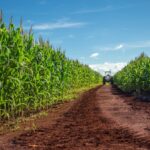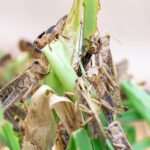Organic soil management is essential for promoting sustainable farming practices and enhancing soil health. For South African farmers, using organic methods to manage soil can improve crop quality, conserve natural resources, and foster long-term agricultural productivity. Here are practical tips to help South African farmers maintain and improve soil quality using organic practices.
1. Enhance Soil Fertility with Organic Matter
Use Compost: One of the most effective ways to enrich soil is by adding compost. Composting not only reduces farm waste but also provides the soil with essential nutrients, improves moisture retention, and promotes beneficial microbial activity. Create compost by decomposing vegetable scraps, plant material, and other organic farm waste.
Apply Manure: Manure from livestock can serve as an excellent natural fertilizer. Ensure that it is well-composted before applying it to the fields to avoid pathogens and to make nutrients more accessible to plants. Chicken manure, in particular, is rich in nitrogen, while cattle manure is a balanced option for general soil enrichment.
2. Practice Crop Rotation
Crop rotation involves growing different crops in the same field across different planting seasons. This practice prevents nutrient depletion in the soil, reduces the risk of pest infestations, and helps maintain soil structure. For instance, rotating heavy-feeding crops like maize with legumes such as beans or cowpeas can replenish nitrogen levels in the soil.
3. Use Green Manure Cover Crops
Planting cover crops like clover, alfalfa, or rye during the off-season can have several benefits for soil management:
- Nutrient Fixation: Legume cover crops fix nitrogen in the soil, making it available for subsequent crops.
- Weed Suppression: Cover crops shade out weeds, reducing the need for manual or chemical weed control.
- Erosion Control: Green manure protects the soil surface and prevents erosion, particularly in regions prone to heavy rainfall.
4. Employ Mulching Techniques
Mulching involves covering the soil surface with organic materials such as straw, wood chips, or dried leaves. This practice:
- Conserves soil moisture by reducing evaporation.
- Regulates soil temperature, keeping it cooler in the summer and warmer in the winter.
- Suppresses weed growth and minimizes erosion.
- Improves soil structure and organic content as the mulch decomposes.
5. Enhance Soil Structure with Natural Amendments
Add Rock Minerals: Minerals such as rock phosphate and gypsum can provide essential nutrients to the soil. Rock phosphate adds phosphorus, which is crucial for root development, while gypsum helps improve soil structure by breaking up compacted soil and enhancing drainage.
Use Lime for pH Balance: In some South African regions, soil acidity can hinder crop growth. Lime is an effective natural amendment that can help neutralize soil pH, creating a more suitable environment for most crops.
6. Encourage Beneficial Microorganisms
A thriving population of beneficial microorganisms is vital for soil health. These microorganisms decompose organic matter, fix nitrogen, and improve nutrient availability. Farmers can:
- Use Bio-fertilizers: Products containing mycorrhizal fungi or nitrogen-fixing bacteria can be applied to enhance microbial activity.
- Avoid Over-Tillage: Excessive tilling can disrupt the soil structure and kill beneficial organisms. Practice minimal tillage or no-till farming to maintain soil health.
7. Adopt Water-Conserving Practices
Water scarcity is a common challenge for many South African farmers. Implementing water-efficient practices ensures that soil remains hydrated without over-reliance on water resources:
- Drip Irrigation: This method delivers water directly to the plant roots, reducing water wastage and soil erosion.
- Rainwater Harvesting: Collect and store rainwater during the wet season to use during dry spells, supporting consistent soil moisture levels.
8. Implement Natural Pest Control
Pesticides can disrupt soil ecosystems, so consider using organic pest control methods such as:
- Companion Planting: Planting crops that naturally repel pests, such as marigolds or basil, alongside primary crops can protect against certain insects.
- Biological Controls: Introduce natural predators like ladybugs or parasitic wasps that help control pest populations without harming the soil.
9. Test Soil Regularly
Regular soil testing provides valuable information on pH levels, nutrient content, and overall soil health. Use this information to adjust organic soil management practices and ensure that crops receive the right balance of nutrients. Local agricultural extension services often provide soil testing and can offer recommendations based on the results.
10. Educate and Stay Informed
Stay informed about the latest organic soil management practices by attending workshops, joining farmer cooperatives, or connecting with agricultural experts. Sharing knowledge with other farmers can lead to new insights and improved methods for maintaining healthy soil.
Organic soil management is not just a practice but a commitment to sustainable farming and long-term productivity. By implementing these organic techniques, South African farmers can enhance their soil’s fertility, promote biodiversity, and improve crop yields while preserving the environment. With consistent application and adaptation to local conditions, these practices can form the foundation for resilient and prosperous farming in South Africa.
Join 'Farmers Mag' WhatsApp Channel
Get the latest Farming news and tips delivered straight to your WhatsApp
CLICK HERE TO JOIN






